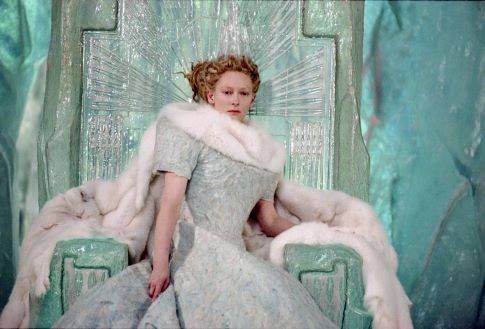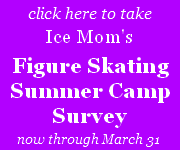Note from Ice Mom: The comments section for this post is awesome. Thanks, readers, for your advice and personal anecdotes. I'm sure you've helped a lot of frustrated figure skaters.
Hello, Readers. This post is courtesy of a reader who is having problems with higher-level figure skaters who are making her ice time miserable. Here’s the e-mail:
Icemom-
I regularly follow your blog and was wondering if maybe you or your readers could help me out with an issue I'm having. I'm 19 and started skating merely 6 months ago. I've come to skating from 15 years of dance training so I'm not struggling, and have a lot of family support in choosing skating over dance. I realise I've started far too late and am far too old to get anywhere besides competing in adult divisions- and that's the cause of my issue.
At my rink I have the earliest ice time, 4 a.m., with my coach. Straight after at 5.30 is an open figure session, where I work on what I've been assigned (at this point, edges, balance and jump preparation). However this is rather impossible as the 13-16 year old "senior" level skaters have taken it into their heads to taunt me and interrupt my practice by either stopping directly in my path, entering jumps or fast spins very close by. I've informed my coach, and she's seen this going on; however, she doesn't coach any of the girls and isn't ice marshal for that session, and so can't tell them off. She's spoken to their coaches who refuse to acknowledge their students are capable of such things. I don't want to move rinks because it would be far more travel and I would lose my coach.
It's at the point where I'm leaving the rink straight after my lesson to avoid these girls, because their actions and attitudes are too much to ignore.
I put this question out to my advisory board and here’s what we came up with:
Ice Mom: This problem happened to Ice Girl, too, especially when she was new. I think it has a lot to do with the culture of the rink. Fortunately for Ice Girl, the other coaches and the ice monitor were supportive of Ice Girl when an ice troll plowed into her and left Ice Girl sprawled on the ice. We were new to the club, so the other coaches and the ice monitor took the problem to the board and the board put the troll on probation.
However, it sounds like coaches and ice monitors aren’t supportive of you. Document a week or two’s worth of incidents and include details like the skater’s name, the problem, what you did to correct it, and the result. Approach your skating club’s board with your list. Point out how hard it is to grow a program if new skaters don’t feel welcome.
You pay the same amount of money as the mean skaters to be on that ice. You don’t get a discount if folks are mean to you. Fight for it.
(Ice Girl has since tried killing the ice troll with kindness and the troll has softened some and is nice back to Ice Girl. Ice Coach and I think that Ice Girl should leave the troll alone, but I.G. is a nice person. Nicer than I am, obviously.)
Ice Coach: I say: I feel her pain. Even if there isn't much her coach or the others will do about it, I would tell her not to give in. She has just as much of a right to be there as everyone else. Just because she is a lower level [skater] doesn't mean she has to be the one that moves out of the way all the time. She should stand her ground and make the others move out of her way sometimes, too. Or say something to them when they stop in her path like "excuse me." If she confronts it, in a nice way of course I bet the younger skaters will get the point.
Remember when [the ice troll] decided to jump on top of [Ice Girl and me] last year during a lesson? All I said was "excuse us." Of course, it wasn't the nicest voice, but guess what - she didn't do it again. I think she would just rather people ignore her while she stomped off.
C.L.: I think this gal should talk directly to the skaters in a non-confrontational tone. For example: "I just wanted to let you know that I'm uneasy if you get to close to me while I'm on the ice." "I'm not as experienced as you and I don't want to cause an accident." "I really enjoy skating but I'm concerned for my safety when you guys spin and jump very close to me." If that doesn't work then I would talk to the parents of the skaters.
PairsMom: If the coach has seen no change even after speaking to the other coaches about their student's behavior then it is time to set up a meeting with the Figure Skating director at the rink. This meeting should be brief (15 minutes) and if possible the coach should try to attend with the 19-year-old skater. Also, the figure skating director could post a list of Freestyle Rules and Guidelines on the rink website AND in the monitor booth. Each skater (and/or parent), regardless of age or level, needs to sign a freestyle contract stating that they will abide by the rules and regulations posted by the figure skating director, etc. Also, it might be helpful if the 19-year-old skater brought along some friends, other skaters her age/level to skate on the same sessions with her.
By the way: congratulations to PairsMom’s son and his partner, gold medal pairs winners at U.S. Junior Nationals in December 2009!
S.F.: I forwarded this problem to my daughter's ice coach and she suggested the following: This should be brought to management's attention. Coaches are supposed to be role models and teach more advanced skaters to be thoughtful of younger or lower level skaters. [Our rink] has rules posted and if they are not followed, we meet with the coach, skater & parent. If the skater doesn't want to cause issues, I would ask for the rink's freestyle rules first.
Bottom line: This is an issue of safety, etiquette, and money. No one should bully other figure skaters off the ice or jump so close that it's a safety issue. Take it up with the skaters, the coaches, the parents, and board/rink management. It’s not fair. Don’t let the ice trolls win.
The comments section is terrific for this post. Here's a sampling of what folks are saying:
Update: From Reader Heyfigureskate: This year, I have finally sucked in my pride and when [this skater] would perform a really nice move, I would say "Good job!" or when she would fall, I would ask, "Are you okay?" Since, when she comes to the rink (rarely) she compliments me as well. So a good turnout I suppose...
Update: From Reader Anonymous: All I can say is that you have every right to be out there and practicing. Believe me, they were beginners at some point. You don't need to be rude, but stand your ground.
Update: Terrific comment from Xan of Xanboni! (read it all in the comments section): If you are following basic practice ice protocol-- don't stand in the middle of the ice, keep moving, hold to standard jump and moves patterns, yield to program run throughs and lessons, etc.-- just hold your ground. They will pull back at the last minute. If you are called on it you can either plead ignorance, like they are doing, or say, "oh I thought the general protocol here was never yield to another skater, since that's what always happens to me" (a wide-eyed innocent, yet subtly sarcastic delivery would be called for here.)
Update: From reader TNT: Sometimes newer skaters are a hazard because they are either oblivious to other skaters, oblivious to the rules (lutz corner, spin areas, right of way goes to lessons and those doing their program) or unable to get out of anyone's way because they lack the skills to do so. Not sure if that is the case here, but if so the skater should seek a different session until they are no longer a safety hazard.
Sometimes newer skaters are not accustomed to how close other skaters may be on a freestyle session, and that can be scary. It's not always harrassment; sometimes a newer skater desires a wider "comfort zone" but on a high-powered or crowded freestyle session that's just not possible.
Update: From reader Season: I used to skate when I was younger and I'm also African American. Unfortunately, racism was and sometime is still a big problem in the skating community. My daughter and I have experienced skating trolls since we have been involved in skating because of racism. Many Caucasian skaters that are racist feel that African American skaters have no business being on their ice or involved in their sport. They feel that skaters of other race bring down the integrity of the sport and they doing anything possible to sabotage your chances of being successful. [...]
[...]It is important to remember that skating trolls are breed and created by parents and coaches that are not considerate of other skaters. These parents and coaches do not and sometimes refuse to teach their skaters respect and common curtiousy. Another problem is that most of the skaters that act this way are skating more than they are able to socialize with other people that are not skaters. Their whole life is skating and they have no balance in their lives. They loose their ability to socialize and act appropriatly around people who do not skate as much as they do. It is very sad. Because after skating is over they do not know how to be a normal happy person. I hope this is helpful. Adult skater and skating mom for 12 years, Season Williams
Update from the ice-troll victim: I thought I would give you an update on the Ice Trolls and the situation. Upon reading your entry (thanks to your panel!) I rang the Rink Director (who also arranges the Figure Club), my coach and the 5.30am Ice Marshal to schedule a meeting, which is in a week's time. I have both written evidence, other skaters who have witnessed the occurances and also some video footage- taping your routine can turn around to bite you!
I also had something to say about some of the comments given to the blog entry- a few people thought I was on practice ice above my level. At our club, if you've been in lessons for 6 or more months and are a member of the club, you can use practice ice. It's called 'Figure Ice' and the only requirement is the novice Aussie Skate levels, no jumps or spins if you don't want. I am well versed in where jumps, figures, spins, etc are to be executed, and being a dancer I don't have a large 'comfort zone'. These girls are using physical and verbal bullying.I just wanted to clarify that we don't use 'Freestyle Ice'- maybe it's an American thing? But all is in action to hopefully have them stopped.
If not, I'll try IG's route and kill them with kindness :)
Update: From reader Rosalie who gets an atta-girl award: I've had to deal with bullying, too, and it wasn't because I was new. The bullying didn't start until after I had been skating for a while. However, other coaches, the Skating Director, and the Ice Marshals were not helping (even contributing) to the problem. Eventually, I went with my now skating partner to general management (who mostly dealt with hockey and employees in the box office, etc.) to talk about my problems. I still get the cold shoulder, but the rest of the bullying stopped.
Do you have advice for this skater? Please share your thoughts or stories in the comments.
Do you have a question for Ice Mom? E-mail me at icemom.diane@gmail.com. I'll do my best.
Monday, December 28, 2009
Subscribe to:
Post Comments (Atom)












9 comments:
First I'd like to say love your blog, and I look forward to reading it every Monday!
Next I have to say that in a way I have experienced similar events. When I first started skating last year, it was strictly group lessons and more for fun not for competition. (but we did learn stuff such as jumps, spins, etc.)I started at kinda a late age,(most girls my age probably have their axel down, and maybe working on doubles now too) my early teens, and in my sesson were loads of younger kids. I felt really stupid because there was, particularly a girl (half my age) who was pretty great for her age. She came to get extra ice time for her competition. Meanwhile, I would attempt to learn all these new moves the coach would assign. Then we would go off in out own little areas and work on what we learned. However, this little girl would go off and do her own thing. Many times she would cut me off, etc. Now I know she's a little girl and maybe she does not know better, but when she does it five or six times, I believe she knows what she is doing. Plus, whenever I started working on jumps, yes I was uneasy like everyone else when they started, but, this little girl would observe me, then when I would mess up or finish the move, she would go and do the same move and show off right in front of me, like trying to show me up.
I never said anything because she is, yes, just a little girl, and because she never said anything, or physically hit me, as the experience Ice Girl had. But, yes it was quite annoying.
This year, I have finally sucked in my pride and when she would perform a really nice move, I would say "Good job!" or when she would fall, I would ask, "Are you okay?" Since, when she comes to the rink (rarely) she compliments me as well. So a good turnout I suppose....
Good luck to the 19 year old! I hope everything works out well for you! (:
I also use to have this problem. Being an adult skater I think some of the kids and their parents think Why are they out there and why are they wasting my kids ice time. All I can say is that you have every right to be out there and practicing. Believe me they were beginners at some point. You don't need to be rude, but stand your ground. Good Luck!
It is certainly wrong for anyone to purposely interfere with another skater's practice time - it's bad enough when it happens by accident! But I have to wonder... if a skater has only been skating for 6 months and is working on edges, balance and jump preparation, is an early morning freestyle session really the place to do that? I know that a 19 year old has different scheduling issues than a younger beginner but at our rink a skater has to have reached at least Freestyle 1 to be allowed to skate at the freestyle sessions. That's as much for everyone's safely as anything else. Right before competitions, our freestyle sessions fill up with lower level skaters who want to practice their programs to the music on the loudspeaker. It's completely understandable, but once the lower level skater's lesson is over, it can become dangerous when they just stand in the center of the rink or linger in the lutz corner. Presumably this isn't the issue here - it's awful for the other girls to be so mean to her. But I know that our rink has different kinds of freestyle sessions - elite, pairs, open and adult. Maybe she could see if her rink could support an "adult" session? Or maybe there's a public session that's fairly empty? And yes, the rink manager should be contacted and someone should talk to those girls even if their coaches won't. And it should be brought to the rink manager's attention that the coaches refuse to talk to the girls.
I'd like to say it's hard to believe that the coaches won't do anything but at our rink we actually have a COACH who exhibits some of that behavior! A few weeks ago, my daughter was in the center of the ice, belt on, waiting for her music to be played and a coach skated past her so close and so fast I thought she would fall over! Of course she didn't but I'm keeping my eye on him...
This problem originates with the coaches and is supported by the ice monitors. Not only are there coaches who don't stop this behavior, but in fact there are coaches who actively teach skaters to do this. If the monitors observe this and don't immediately squelch it that's a huge problem.
Documenting is one way, although if the coaches and monitors are denying the problem it's just he-said-she-said.
A better way to do this is just refuse to get out of the way. Adult skaters in particular have trouble learning this lesson, because it's scary, number one, and counterintuitive number two, but the aggressive skaters don't want to run into you any more than you want to be run into.
If you are following basic practice ice protocol-- don't stand in the middle of the ice, keep moving, hold to standard jump and moves patterns, yield to program run throughs and lessons, etc.-- just hold your ground. They will pull back at the last minute. If you are called on it you can either plead ignorance, like they are doing, or say, "oh I thought the general protocol here was never yield to another skater, since that's what always happens to me" (a wide-eyed innocent, yet subtly sarcastic delivery would be called for here.)
This will be a long comment, but I was a child skater and now I am an adult skater so I've seen this issue from both sides.
There is a minimum level of competence needed to be on a freestyle session, as pointed out by a couple of commenters here. For example, someone who has never skated before in their life should not be on a freestyle session.
Sometimes newer skaters are a hazard because they are either oblivious to other skaters, oblivious to the rules (lutz corner, spin areas, right of way goes to lessons and those doing their program) or unable to get out of anyone's way because they lack the skills to do so. Not sure if that is the case here, but if so the skater should seek a different session until they are no longer a safety hazard.
Sometimes newer skaters are not accustomed to how close other skaters may be on a freestyle session, and that can be scary. It's not always harrassment; sometimes a newer skater desires a wider "comfort zone" but on a high-powered or crowded freestyle session that's just not possible.
Sometimes adult/older skaters are harrassed, even when they are quite good skaters and not a safety hazard. Not all youngsters are brought up with good manners, unfortunately. If the newbie skater is indeed competent to be on the session and this is not a case of newbie paranoia, then the bad behavior should be brought to the attention of management. Be sure to point out that you pay your ice bill on time and intend to be skating -- and paying -- for a long time. Likely much longer than the little brats, uh, bullies.
I used to skate when I was younger and I'm also African American. Unfortunately, racism was and sometime is still a big problem in the skating community. My daughter and I have experienced skating trolls since we have been involved in skating because of racism. Many Caucasian skaters that are racist feel that African American skaters have no business being on their ice or involved in their sport. They feel that skaters of other race bring down the integrity of the sport and they doing anything possible to sabotage your chances of being successful.
My daughter and I have also been on the other side of the fence. My daughter is a high level skater and when she is trying to practice on a high leve free skate session at our rink, many times lower level skaters who do not know skating patterns that will prevent them from getting in another skaters way while they are working on a higher level jump or spins, will practice on these high free skate sessions. This can be very frustrating for a higher level skater, especially when they are working on a program and preparing for competition. My daughter is not a troll however when it comes to this sort of problem she says excuse me and does her best to avoid on-coming skaters. Adult skater and skating mom for 12 years, Season Williams
I do agree that anyone who is encountering skating trolls should try to first confront the skating trolls one-on-one and if that does not work to go to the parents of the trolls to work out the matter. If that does not work then approach the coaches of the trolls with your coach their to support you. Finally, if that does not work approach the skating director and have the skating director come and watch the session from a discreet area so that the skating trolls do not know that she is observing the problem and start changing their behavior into little ice princesses. If the skating director is not able to help. You should approach with your coach the figure skating club board. All figure skating club boards should have a grievance policy and the board memebers will tell you how the policy works. This policy should also have strict reprocussions for any skaters that are not following the rink and club rules. The club should also have rules from USFSA that should be followed with regards to repremanding skaters that are not following rink and club rules. If the figure skating club can not handle the problem than the skater should go to the rink manager and have the manager monitor the session discreetly along with the skating director and the skating director and manager should be able to fix the problem. Usually the rink manager is not a figure skater and is not familar with skating ettiquete but it is their job to make sure that the skaters at their rink are safe and comfortable while skating at their rink. If any skater has followed this chain of command and not gotten a satifactory result than they may have to consider finding another rink to practice skating. The skater can continue to take lessons at the rink with the coach they like but they may need to find another rink to practice or another time when the trolls are not lurking around to practice. Also skating trolls usually act worse when their is more than one of them around. They like a good audiance. If you can find a session that only one troll is skating on you may not have as much trouble with only one skating troll. You may even be able to befriend that skating troll and she may be able to persuade the other skating trolls to be nicer too you. I know this sounds like a sad possibility but sometimes the non-offending skater has to take the high road. I realize this does not make the problem better, go away and sometimes it will make the problem worse but if you want to be happy and enojoy skating it sometimes has to happen.
It is important to remember that skating trolls are breed and created by parents and coaches that are not considerate of other skaters. These parents and coaches do not and sometimes refuse to teach their skaters respect and common curtiousy. Another problem is that most of the skaters that act this way are skating more than they are able to socialize with other people that are not skaters. Their whole life is skating and they have no balance in their lives. They loose their ability to socialize and act appropriatly around people who do not skate as much as they do. It is very sad. Because after skating is over they do not know how to be a normal happy person. I hope this is helpful. Adult skater and skating mom for 12 years, Season Williams
I skated as a child and now as an adult. I agree with many of the other commenters, particularly TnT and Xan. My advice to the bullied skater would be a combination of what the other commenters have said.
First, I would ask for (or find on the club's website) the freestyle rules and familiarize myself with them, paying close attention to the right of way and where certain moves should be performed. It might even be helpful to just watch another freestyle session so you can see it in action rather than being in the middle of it. See how close skaters get to one another, etc.
Next, make sure to keep the freestyle rules in mind during your sessions. If you are certain you have the right of way, say "excuse me" and hold your ground. This also might help if they are not intentionally doing it - aside from the skaters who stop directly in your path, they might not realize they're making you uncomfortable. If that doesn't work, then escalate it to the next level (ice monitor, FS director, manager, etc).
At my old rink, there was a skater who was about 10 or 11 and known to be a bully. We were about the same level, but I was a few years older. One day I was in my lesson and doing my program to the loudspeaker - I was heading in the same direction as the bully (who was not in a lesson). I said, "Excuse me." She made a hand motion and said, "Scooch!" I said, "Lesson and program - right of way!" and kept going. She ducked out at the last second.
I've had to deal with bullying, too, and it wasn't because I was new. The bullying didn't start until after I had been skating for a while. However, other coaches, the Skating Director, and the Ice Marshals were not helping (even contributing) to the problem. Eventually, I went with my now skating partner to general management (who mostly dealt with hockey and employees in the box office, etc.) to talk about my problems. I still get the cold shoulder, but the rest of the bullying stopped.
Post a Comment